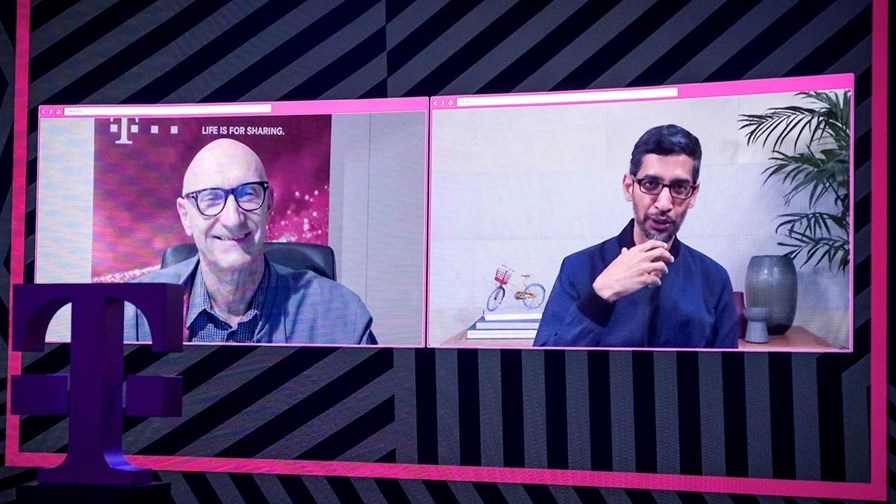
DT's Tim Höttges (left) and Google's Sundar Pichai discuss the latest news about the partnership between Deutsche Telekom and Google.
- Deutsche Telekom deepens partnership with Google with focus on messaging, cloud and TV services
- The move reflects a broader trend across the ecosystem as operators embrace their tech giants ‘frenemies’ with increasingly open arms
- But operators need to ensure they don’t cede too much control to their hyperscaler partners, notes Analysys Mason
German operator Deutsche Telekom has deepened its relationship with Google in a number of key service areas, including mobile messaging for enterprises and cloud computing services, in a move that reflects the growing willingness of telcos to put their faith in the capabilities and partnership potential of their hyperscaler buddies.
The enhanced relationship covers developments in three particular service segments, including cloud computing and digital TV, but perhaps the most important part of the German operator’s announcement is the introduction of its Telekom Rich Communication Service (RCS) Business Messaging service, which is now available across its European footprint.
The offering is provided by Google and enables multimedia messages to be shared between companies and their customers in a secure and efficient way, according to Deutsche Telekom.
As consumers order products, purchase tickets and make reservations through “a seamless digital experience” in their messaging app, companies can reach out to their customers either individually or in groups in an effective way that can enhance brand loyalty, according to the partners. Businesses are also able to tailor the design of the messaging service to their brand.
The operator assured that spam messaging wouldn’t be possible as the Google messaging platform that underpins the service verifies in advance the companies that can contact end customers.
“Protecting personal information is of the utmost importance to us. With our new service, we are making fast messaging from people to people, and especially between companies and their clients, secure and convenient,” boasted Deutsche Telekom’s CEO Tim Höttges.
The operator added that the expanded Google partnership has also brought its RCS messaging service to consumer customers in Germany, building upon its earlier availability in 10 of its other markets across Europe (Austria, Croatia, Czech Republic, Greece, Hungary, Netherlands, North Macedonia, Poland, Romania and Slovakia).
In addition, the pair said the German Sovereign Cloud, which was announced last year, will launch ahead of schedule. It was initially planned for mid-2022 but now Deutsche Telekom said it will be made available this spring as a result of the partners’ efforts.
The two companies also plan to open a co-innovation centre in Munich, alongside executive briefing facilities there and in Berlin. The initiative is boosted by the German government’s digital push looking to build a public administration based on a multi-cloud strategy and open interfaces.
Höttges cited a need by many companies, especially in key sectors such as public, healthcare and automotive, to have sovereignty when they use cloud services.
The two companies also introduced MagentaTV One, a “premier TV box,” making it possible for Android-based TVs to access apps from the Google Play Store.
Describing the German operator as “a longstanding and important partner’, Google CEO Sundar Pichai said the announcements will widen the range of “helpful and trusted products and services that we can provide to businesses and consumers across business messaging, cloud computing and TV experiences”.
The two companies first joined forces in 2008, Pichai noted.
Operators and hyperscalers
The move by Deutsche Telekom clearly demonstrates how network operators are forming deeper and more strategic relationships with the hyperscaler giants.
Just a few days ago, Google set aside a $1 billion investment in India’s second biggest operator, Bharti Airtel, a move that looks set to result in the development of more affordable mobile device access, 5G use cases and India’s cloud ecosystem.
Similar actions are also planned as a result of Google’s $4.5 billion investment in India’s market leader, Jio. Google has also made tie-ups with Telecom Italia, Telefonica and T-Mobile, to name a few.
A recent report from Analysys Mason suggested operators could benefit a lot from hyperscalers, as the latter could help with improving capex efficiency and network capabilities, alongside scaling up their new networks more quickly. The research and consultancy company cautioned, though, that operators need to ensure “they retain control of the network, especially its quality, when they migrate the network to the cloud”.
- Yanitsa Boyadzhieva, Deputy Editor, TelecomTV
Email Newsletters
Sign up to receive TelecomTV's top news and videos, plus exclusive subscriber-only content direct to your inbox.




